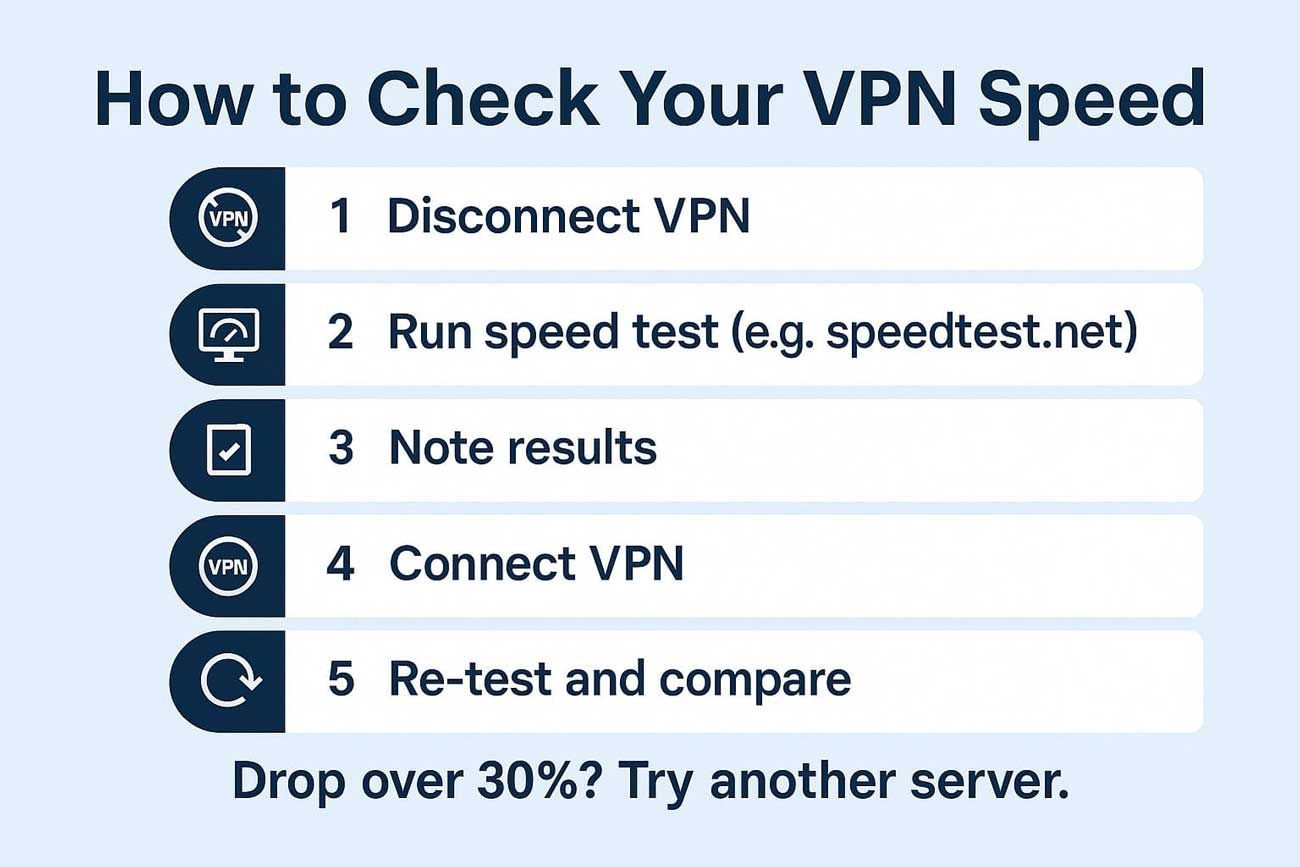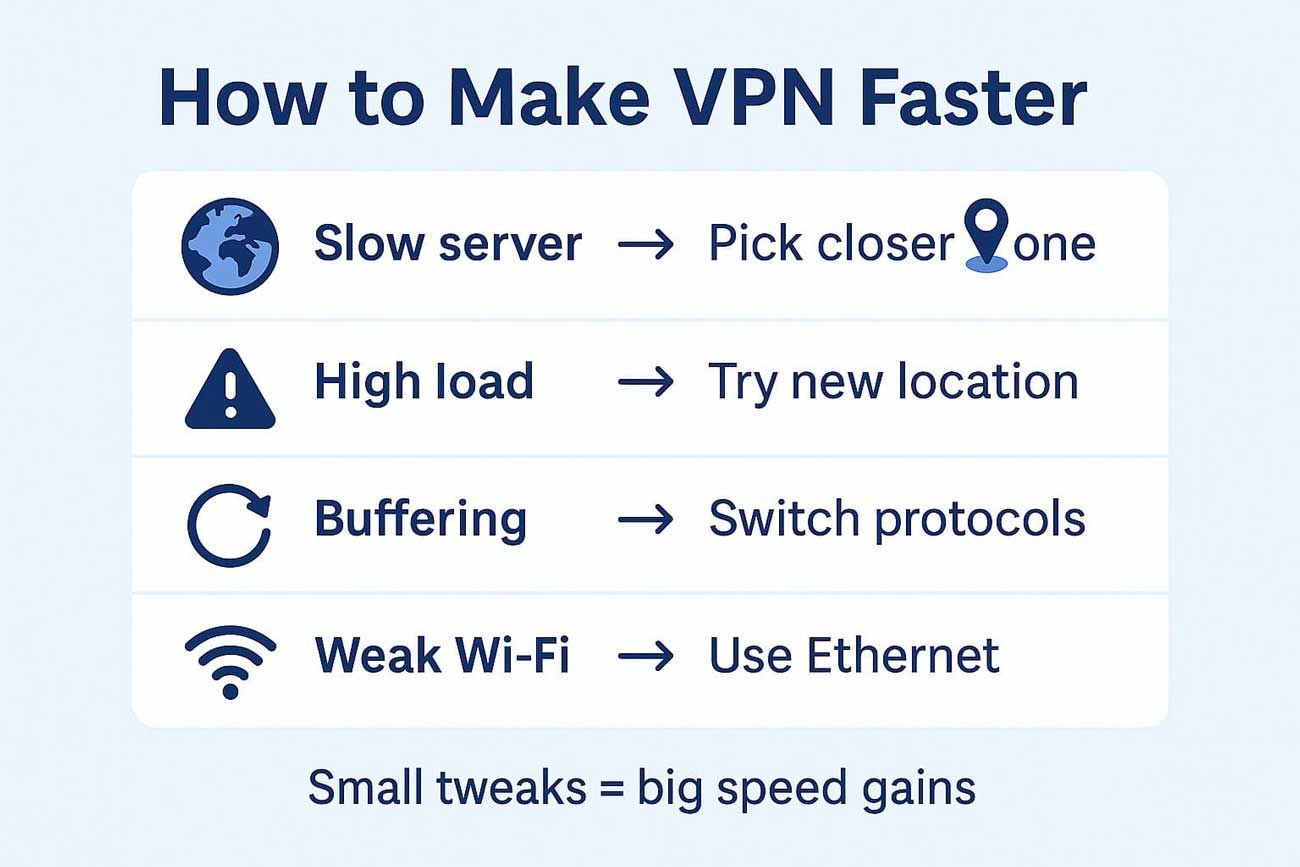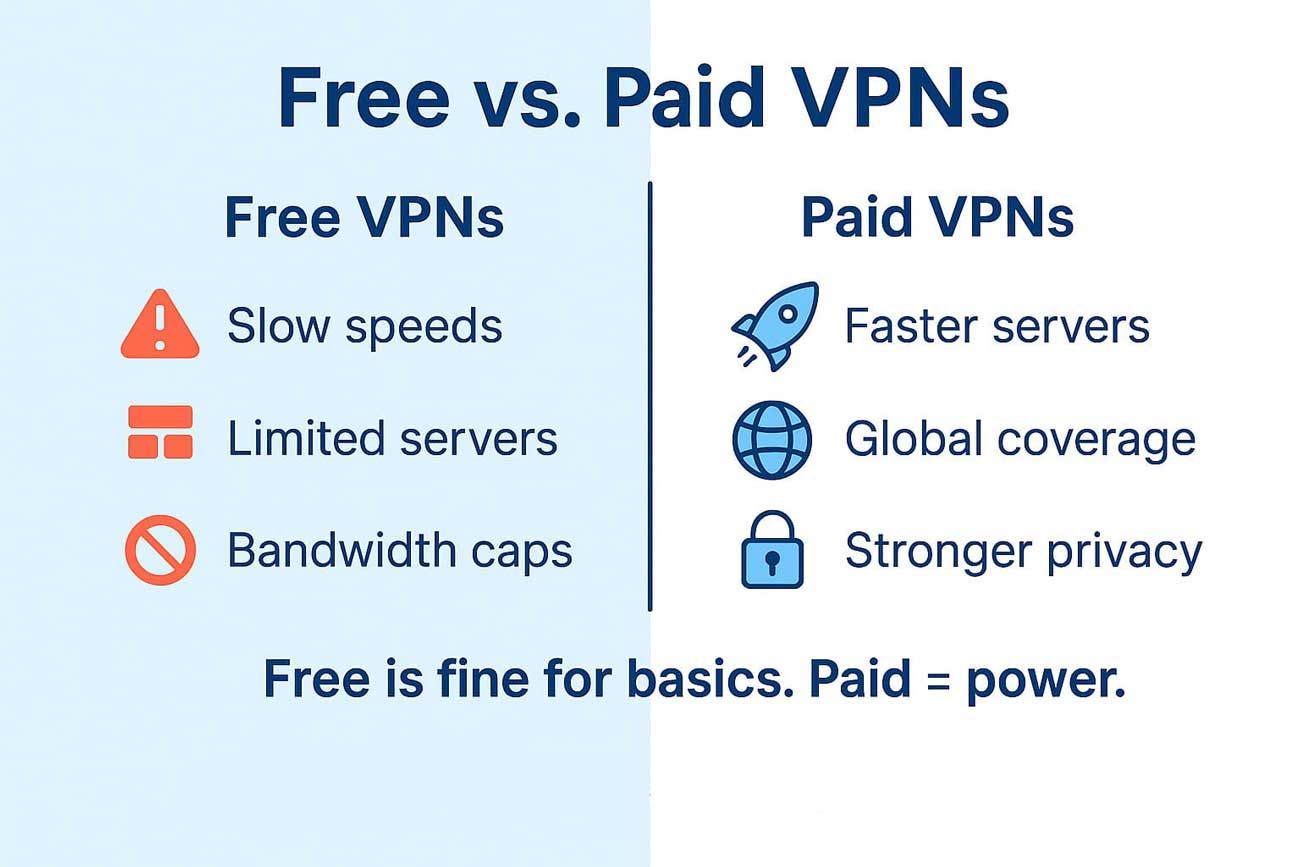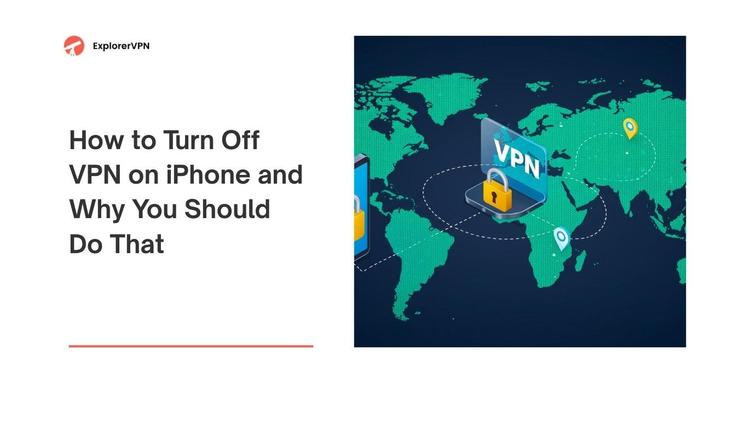A VPN, or Virtual Private Network, is a tool that protects your Internet connection by hiding your IP address and encrypting your data. It helps keep your online activity private, especially on public Wi-Fi, and lets you access content or websites that might be blocked in your country or region.
If you’ve ever tried watching a video, playing a game, or just browsing the web while using a VPN, you might’ve asked yourself: does VPN slow down the Internet? To answer shortly, yes, a VPN can slow down your Internet slightly because it routes your data through an encrypted server, which adds distance and processing time. However, with a fast VPN provider and nearby server, the speed difference is often minimal.
In this article, we’ll break down everything you need to know about VPNs and Internet speed. You’ll learn why some VPNs slow you down, how much speed you really lose, and what you can do to fix it.
Does VPN Slow Down the Internet?
The answer is yes - but that’s not always a bad thing. When you connect to a VPN server, your Internet traffic gets encrypted and routed through a remote location. This can take longer than going directly to a website. Depending on the VPN provider, server load, and location, this can lead to slower speeds.
Some users notice that their VPN connection feels slower, especially if they want to stream content or play games like PUBG VPN or VPN for "Valorant". Still, not all VPNs and Internet speed issues are the same. If you use the right settings and server, the slowdown can be small or even unnoticeable.

how to check your vpn speed
How to Check Your VPN Speed?
If you’re wondering whether your VPN is affecting your connection, the best way to find out is by doing a simple speed test. This will show how much (if any) your Internet slows down when you're connected to a VPN.
Here’s a step-by-step guide to check:
- Disconnect your VPN.
- Go to a speed test site like speedtest.net. These sites measure your download speed, upload speed, and ping (how fast data travels back and forth).
- Write down your download, upload, and ping.
- Now connect to your VPN (like Germany VPN, Frankfurt VPN or other).
- Run the same speed test again using the exact same site.
- Compare the results. If your ping increases a lot, or your download and upload speeds drop by more than 30%, your VPN might be causing a significant slowdown.
Don’t panic if the speeds are slightly lower - that’s normal. If your speed drops a lot, try switching servers or changing protocol settings in your VPN app. Some services even show which server locations have the best speeds.
Why Does VPN Slow Down Your Internet Connection?
There are several reasons why VPN slows down Internet speeds:
1. VPN server location
The farther away your VPN server is, the longer it takes for your Internet data to travel. For example, if you're in Georgia and using a Singapore VPN, the physical distance adds latency.
2. Server Load
Too many people using the same server can slow it down. If a VPN server is overloaded, the connection speed drops.
3. Encryption Overhead
VPNs encrypt your Internet traffic for security. That’s a good thing, but it also takes time. Encrypting and decrypting data adds extra steps, slowing things a bit.
4. Bandwidth Limits
Some free VPNs put caps on bandwidth, making things slower. These services are also usually packed with too many users.
5. Protocols Used
Different protocols (like OpenVPN, WireGuard, or IKEv2) affect VPN speed. Some prioritize speed at the cost of security, while others offer stronger protection but sacrifice performance.
How Much Speed Is Lost?
How much speed is lost depends on your setup, but most people lose between 10% and 30% of their speed with a VPN. If your Internet speed is already slow, it might be more noticeable.
Here’s an example:
- No VPN: 100 Mbps download
- With VPN: 75 Mbps download
That’s not bad if you can still stream content or scroll Instagram with VPN. But if you drop to 20 Mbps, that can feel slow, especially when you're on a shared Wi-Fi network with multiple users.
Also, other factors like server location, time of day, and how many users are online can affect it.

how to make vpn faster tips
Tips to Avoid VPN Internet Slowdowns
While using a VPN can slightly reduce your Internet speed, there are ways to keep your connection fast and smooth:
- Avoid using VPN all the time if you don’t need it.
- Use split tunneling so only some apps go through the VPN.
- Pick nearby server locations
- Use less crowded servers during peak times.
- Regularly review and update your VPN settings.
- Try different devices to see if the problem is device-related.
If none of that works and you still get issues, it might be time to learn how to turn off VPN completely.To turn it off on iPhone, for example, just go to iOS settings > general > VPN & device management > turn off VPN on iPhone. On Android, go to settings app > network > VPN and click disconnect. That’s also good if your VPN isn’t working or causes problems.
Can a VPN Make Your Internet Faster?
It sounds weird, but in some cases, does VPN make the Internet faster? Yes. Here’s how:
- ISP Throttling Bypass: Some Internet service providers (ISPs) watch your online activity and slow down certain types of traffic on purpose — especially things like streaming, gaming, or downloading large files. This is called throttling. When you use a VPN, your traffic is encrypted and your ISP can't see exactly what you're doing. Since it can’t tell if you’re watching YouTube, playing PUBG, or using TikTok, it’s less likely to slow you down. This helps keep your speeds more consistent during high-bandwidth activities.
- Better Routing: A high-quality VPN provider often has its own optimized network infrastructure, which can give your connection better routing than your ISP normally provides. This means your data might take a shorter or faster path to its destination. In some situations, this can actually lead to slightly faster browsing or lower ping, especially if your ISP’s routing is inefficient or poorly managed.
- Avoiding Overloaded Routes: When too many people are using the same Internet routes — like during peak hours — your connection can slow down due to congestion. A VPN might avoid those overloaded routes by connecting you through an alternate server path that has less traffic. This can lead to a smoother and more stable connection, especially when accessing websites or apps hosted in other countries or regions.
So yes, it is true that in some cases, a VPN can actually make your Internet faster, especially if you’re connected to a well-optimized server like a Los Angeles VPN for better access and performance.
Ways to Improve Your VPN Speeds
If your VPN keeps slowing down your connection, here are some effective ways to fix the issue:
- Switch VPN Server. Pick a closer or less crowded server. For example, if you're in Europe, don’t use Los Angeles VPN unless you need to, because the farther the server is, the longer it takes for your Internet data to reach it.
- Change Protocols. Some VPN apps let you pick faster protocols. Try WireGuard or IKEv2 instead of OpenVPN.
- Use Ethernet. Wi-Fi can be weak. If you want max speed, plug your computer into your router with an ethernet cable.
- Turn Off Other Devices. If too many devices are using your home network, everything slows down. Pause downloads on other devices to free up bandwidth and improve connection speed.
- Restart Router. Simple but it works. Unplug your router for 10 seconds and plug it back in.
- Update Your VPN Software. Old apps can run slow. Make sure your VPN software is the latest version.
- Don’t Use Free VPNs. They’re slow. Try a paid VPN service with more servers and better speeds.
Is VPN Performance Worth the Speed Tradeoff?
It depends. If you’re using VPN for school, VPN WhatsApp, or just checking Facebook, small delays might not matter. But if you play games, even a little lag is annoying.
VPNs offer privacy, access to blocked content, and security from hackers on public Wi-Fi. That’s a big deal if you're in countries like China or use public networks. So even if your Internet connection slows down a bit, you gain safety.
Also, not every VPN causes slow speeds. Some top providers can give you the best connection even with strong encryption.

free vpn vs paid vpn infographic
Free VPNs vs. Paid VPNs (Speed Comparison)
If you’ve ever used a free VPN and noticed painfully slow speeds, you’re not alone. Here's how those two compare:
Free VPNs and Speed Issues
Free VPNs often have fewer servers and too many users, which leads to overcrowding and slow speeds. They also impose bandwidth limits, causing buffering during streaming and lag in gaming.
Paid VPNs for Better Performance
Paid VPNs usually offer faster servers, better routing, and support for modern protocols like WireGuard. They provide stable speeds, multiple server locations, and optimized connections for streaming or gaming.
Why Paid VPNs Are Worth It
While free VPNs might be enough for casual browsing, their speed and reliability rarely match paid services. If you want smooth streaming, fast downloads, or gaming without lag, a paid VPN is the better choice.
Can VPNs Offer Both Speed and Security?
Good VPNs try to balance both. You want solid encryption to protect your data, but not so much that your connection becomes useless. Premium services let you choose speed vs. security based on what you're doing.
For example, if you're on public Wi-Fi, you need high encryption. But if you're just trying to watch a video blocked in your country, you can lower the encryption a bit to get faster streaming.
You can even set up things like onion over VPN for extra security layers, but that’s usually slower. It’s useful for sensitive activity, not streaming Netflix or using VPN for mobile legends.
Final Thoughts
So, to answer the question: does VPN slow down Internet? The answer is yes, but it doesn’t have to ruin your experience. With the right settings, good VPN providers, and smart server choices, the slowdown can be small. In some cases, VPN can actually help, especially if your ISP is limiting you.
Just don’t forget to test things. Use speed tests, try to change locations and adjust your VPN usage based on what you need - privacy, speed, or both. Also, on't forget to understand, why the VPN is not connecting at all.
If your connection ever becomes too slow or buggy, remember how to disable VPN on iPhone or how to turn off VPN on Android.








